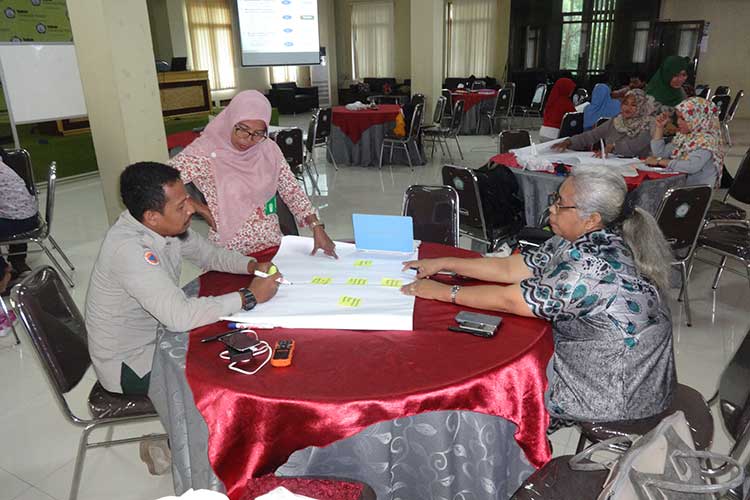Over the last two years, USAID Adapt Asia-Pacific has been working closely with local universities and training institutions to deliver the five-day UCCAR training course, which aims to build the capacity of urban local governments to address climate change and accelerate their efforts to integrate climate change resilience into local strategies. The course helps local government officials and practitioners better understand urban development and climate change linkages and builds their capacity to develop project proposals to adapt to the negative effects of climate change.
“Getting the fundamental knowledge about climate change right is the first step,” said Ridwan Lessy, Head of Khairun University’s Disaster Study Center in Ternate, Indonesia. “With knowledge, we can then build our capacities to adapt and face climate change.” Lessy was one of the participants who attended the UCCAR training held at his university in July 2016. He is also leading the effort to incorporate what he has learned into Khairun University’s curriculum.
“In Ternate, Indonesia, we always need more climate data, but the key question we need to ask ourselves is, once we get that data, what will we do with it?”
Ternate is a small island situated in eastern Indonesia, with a population of around 200,000 – over 80% of its people live in coastal areas. Ternate’s landscape is dominated by the volcanic Mount Gamalama. Besides lying in a very active seismic region where frequent earthquakes are common, Ternate is also particularly vulnerable to the impacts of climate change, such as sea level rise and extreme weather events.
“Oftentimes communities just want the government to build them a seawall to protect their homes,” said Lessy. “But it is ultimately up to the government themselves to decide how best to respond; in particular, they need to be able to use the information and data at hand to maximize adaptive capacities and outcomes.”
Lessy added that the UCCAR training has prompted him to develop proposals that focus on conducting vulnerability assessments in Ternate and other neighboring islands. These proposals, he noted, would likely be submitted to the Indonesia Climate Change Trust Fund for possible financing.
For USAID Adapt Asia-Pacific, partnering with local institutions and champions, like Lessy, has greatly enhanced the overall effectiveness of the training, particularly in delivering on the ground results. Course materials are tailored to the local context, which include relevant and customized data sets and case studies. Importantly, the UCCAR training materials are also linked to national and local laws, policies, and regulatory requirements for urban climate change adaptation.
“The knowledge gained from this training has been very useful and relevant for me and my colleagues,” said Lessy. “We will continue to look for the best ways to integrate and incorporate what we had learned during the training with the work we’re doing here at Khairun University.”
The UCCAR training manual and course materials are freely available to training institutions and government agencies in Asia-Pacific looking to deliver urban climate change adaptation project development and finance training. The materials may also be useful for practitioners and individuals working in related sectors looking for a comprehensive set of tools and how-to guides for urban climate change adaptation.
PDFs of PowerPoint presentations with facilitators’ notes and worksheets, and a training manual, are available for download here: http://www.adaptasiapacific.org/uccar.
Source: USAID | 11 January 2017














